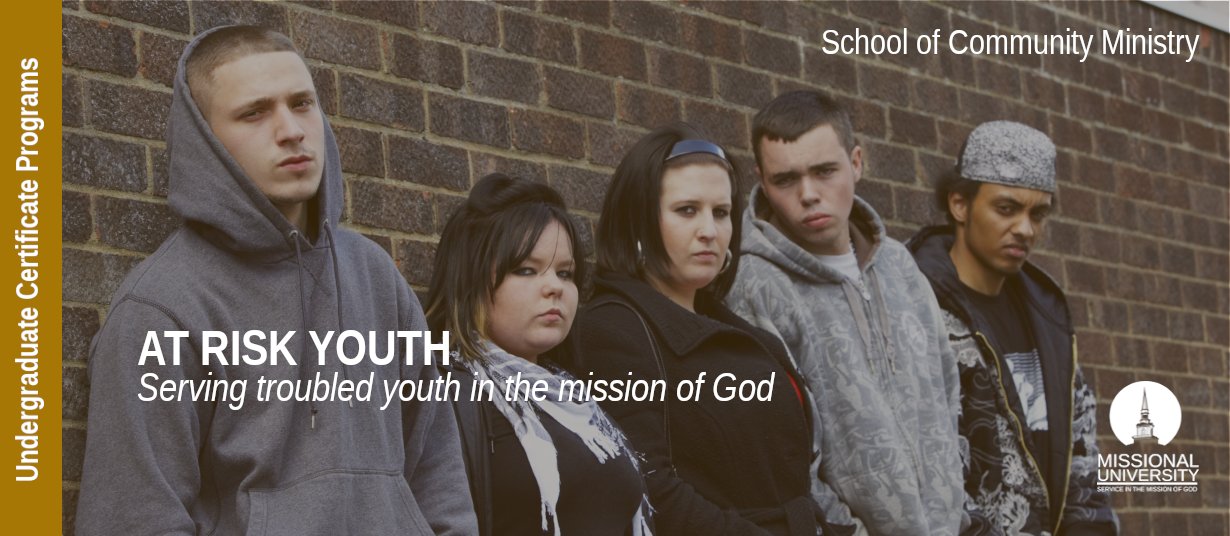
Online Undergraduate Certificate in
At-Risk Youth
⚜ Rarely Offered in Christian Universities, Bible Colleges or Seminaries
Expand Your Missional Service Today!
REQUEST INFORMATION
Ready to learn more about the
Undergraduate Certificate in
At-Risk Youth?
LEARN MORE NOW
The focus of the Undergraduate Certificate in At-Risk Youth is working with vulnerable/at-risk youth within the context of family and community settings. Students learn to examine the beliefs, values and feelings of vulnerable youth from a risk and resiliency perspective. The program addresses social issues facing children and youth from diverse families and minority groups, social distress, disconnectivity, and issues of homelessness. Students develop intervention approaches approprate to various risk issues in the family and community.
Youth at-risk is a child or adolescent who faces extreme threats to a successful transition into adulthood. A variety of factors can contribute to a youth falling in the at-risk category including: poverty, family instability and dysfunction, unstable school environment, poor community resources, and adverse childhood experiences. When at-risk and troubled youth can’t transfer successfully into adulthood, local communities and businesses suffer, costing both millions of dollars. As adults, those with vulnerable backgrounds often develop problems with addiction, violence, self-harm, and substance abuse. Without intervention, many become the adults for whom local communities and governments spend millions on health care and criminal justice. The Undergraduate Certificate in At-Risk Youth provides missional leaders with the background to address the physical, emotional, social as well as spiritual issues of this vulnerable population group.
Program Features
-
Integrated practicums allow you to gain valuable real-world experience
-
Learn from academic practitioners from around the world
-
Credits earned in this certificate program can apply to a Missional University Bachelor degree program
Course Effort
Course Length
Credits Required
Program Cost
What Will I Study?
We offer the most comprehensive approach to serving among at-risk-youth in the mission of God.
The rapid decline of marriage and family as a social institution calls for understanding the family biblically and theologically. This course provides a Trinitarian theological foundation of family. The course will focus on practical insights for missional relationships so that families may thrive as they are on God’s mission amidst today’s unrelenting worldly pressures.
This course is designed to create an environment for Missional students to explore various tenets of working with at risk youth from a risk and resiliency perspective. The purpose of this course is to support Missional students to critically examine their beliefs, values and feelings in relation to at risk populations (specifically at risk youth), explore and apply the Resiliency Enhancing Model, and assess possible roles for the social science professional at the micro, mezzo and macro level of intervention.
Missional students will gain a detailed perspective of the social issues facing children and youth from diverse families and minority groups. Missional students will examine human rights violations, discrimination and prejudice. Missional students will incorporate the ecological systems theory, where they will take into consideration the micro and macro issues affecting youth and families on a social, emotional and psychological level. Missional students will develop culturally sensitive strategies to support Youth and their families.
Missional Students through this course will analyze existing present day issues of risk in the lives of youth and at risk youth from a God center perspective. Missional Students will examine areas of practice using various frameworks explored in prerequisite YFM 2000 Foundations of Work with At Risk Youth and will develop interventions appropriate to the risk issue. Missional students will demonstrate competence in real or simulated examples of risk situations using knowledge, skills, values and styles.
This course affords Missional students the opportunity to study the practices of the family, community and youth discipline. This course will present analytical concepts used in the study of the family, youth and community. Also in this course, emphasis is placed on the vulnerabilities and needs of children, youth, families and communities, and describes human services that maximizes human potential and minimizes personal and societal strain. The course introduces Missional students to the roles and skills of the human service professional.
Missional students interested in ministering to at-risk youth and their community from a Christian prospective will be involved in course information on pertaining to positive youth development and a resiliency approach to youth work. Missional students will work with human services programs that serve young people experiencing social distress, disconnectivity, and/or homelessness. Missional students will create a unique project to strengthen and enhance developmental asset acquisition (skills) and resiliency to help programs reach their goals. These three exercises will enable Missional students to understand the psychosocial factors that place youth and families at risk and how incorporation of developmental assets can help overcome many deficiencies.
Optional Additional Courses:
Missional students being introduced to Human Development and Family Studies field, will gain an understanding of individual and family development over the life span. This course will specifically focus on the developing individual within the context of the family system and the changes that occur in family systems over time.
In Working with Families students will examine client problems within the context of the person and environment with specific attention to the family settings from a social work perspective. Students will strengthen engagement, assessment, planning, intervention and evaluation as they apply to work with children and families and the systems that impact them.
An integrated understanding of individuals, couples, and families within the cultural context. It will offer a study of the family as a system and the difficulties that families experience as they move through life and encounter people from different cultural backgrounds. The course will tackle misconceptions about different culture.
An examination of family stress and coping across the life cycle. Course will address psychological, sociological and biosocial theories and perspectives related to stress and coping. Topics are: parenting, poverty, work and family, violence, disability health/wellness, care-giving, normal/non-normal stress, and bereavement. Risk factors, protective and resiliency factors that facilities recovery will be addressed.
When Can I Get Started?
We offer multiple start dates each year to give you flexibility in your education, life and work schedules.
JANUARY
MARCH
MAY
AUGUST
OCTOBER
A Career in Transforming Communities
Is this Your Mission?
Case Worker, Developmental Specialist, Residential Advisor, Residential Counselor, Residential Instructor, Youth Action Officer, Youth Activities Assistant, Youth Activities Counselor, Youth Advisor, Youth Advocate, Youth Agency Worker, Youth At Risk Counselor, Youth Counselor, Youth Navigator, Youth Services Counselor, Youth Specialist, Youth Development Professional, Youth Worker, Youth Enrichment Educator, Youth Program Instructor, Juvenile Probation Officer, Case Manager, Youth Administrator, Youth Advocacy Director, Youth Program Director, Youth Supervisor, Director Youth Correctional Facility
Request Information Now
How Much Will it Cost?
We offer tuition based upon country of residence. According to the Human Development Index, all countries around the world fall into one of four categories:
-
(Tier 1) - Very High Human Development
-
(Tier 2) High Human Development
-
(Tier 3) Medium Human Development
-
(Tier 4) Low Human Development
Our tiered global tuition makes higher education affordable for everyone world wide.

TIER COUNTRIES
100% Tuition
$295
per credit hour
3 credit course
$885

TIER COUNTRIES
80% Tuition
$236
per credit hour
3 credit course
$708

TIER COUNTRIES
60% Tuition
$177
per credit hour
3 credit course
$531

TIER COUNTRIES
40% Tuition
$118
per credit hour
3 credit course
$354
Tiered tuition based on country of origin and scholarships available. Find your country of residence here for more information.
Tuition may be further reduced by participating in the Sponsorship Program.
